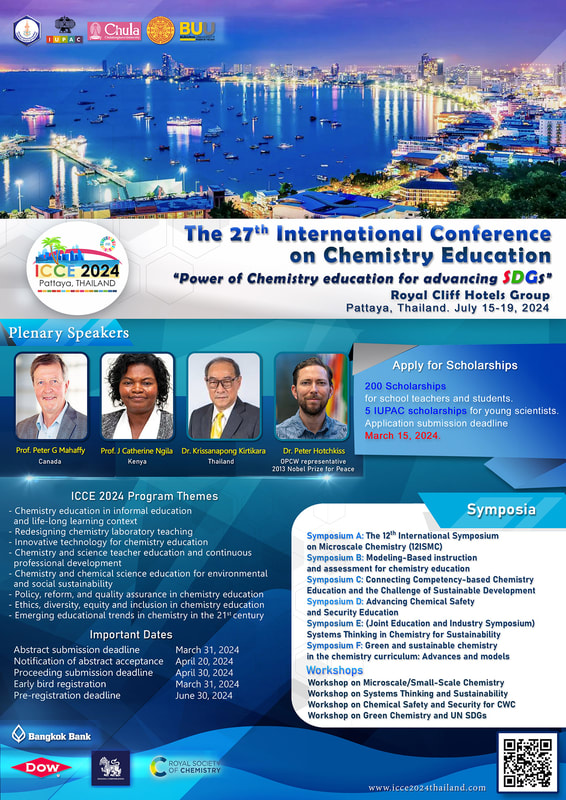Visit to the 12th Intrernational Microscale Symposium, Bangkok Thailand, July 2024
Overcoming Resistance to Innovation.
Bob Worley
John Bradley and other microscale enthusiasts, from diverse countries with diverse teaching conditions, have used innovative micro and small-scale techniques to bring practical work to a new and more inclusive audience of students for over 30 years.
However, we share similar problems, namely a lack of recognition and resistance to innovation. With all the expenditure from IUPAC, UNESCO etc, why are these techniques in all countries not being more widely adopted in place of traditional, large-scale, time-hungry expensive practicals? How do we overcome resistance?
I will describe with videos how our “bottom-up” approach using social media platforms to publish information has gained many followers. Hands-on workshops for teachers and technicians were run by CLEAPSS and SSERC (Scotland), (providers of UK school Health and safety) the Association for Science Education (ASE) and the Royal Society of Chemistry (RSC). A book of activities was published that concentrated on how these techniques improve our chemical understanding. As a result, activities were tried out by our school technicians who introduced them to teachers who then saw the education/environmental advantages.
I am pleased to report that UK Examination Boards are taking a positive interest and it has inspired research interest from UK universities.
Keywords: microscale; practical; sustainability; misconceptions; green chemistry
However, we share similar problems, namely a lack of recognition and resistance to innovation. With all the expenditure from IUPAC, UNESCO etc, why are these techniques in all countries not being more widely adopted in place of traditional, large-scale, time-hungry expensive practicals? How do we overcome resistance?
I will describe with videos how our “bottom-up” approach using social media platforms to publish information has gained many followers. Hands-on workshops for teachers and technicians were run by CLEAPSS and SSERC (Scotland), (providers of UK school Health and safety) the Association for Science Education (ASE) and the Royal Society of Chemistry (RSC). A book of activities was published that concentrated on how these techniques improve our chemical understanding. As a result, activities were tried out by our school technicians who introduced them to teachers who then saw the education/environmental advantages.
I am pleased to report that UK Examination Boards are taking a positive interest and it has inspired research interest from UK universities.
Keywords: microscale; practical; sustainability; misconceptions; green chemistry

Worksheet Presentation
|
Magda and I from CLEAPSS are taking some small workshop examples for the teachers to try.
|
| ||||||
|
G to https://icce2024thailand.com/icce2024thailand.com/
|
About the MeetingAn international group of educationalists have met regularly in a different country since 2000 but since COVID it has been difficult. This is the first face to face meeting. Since 201.
Professor Supawan Tantayanon has been a fervent supporter, so we are blessed with a large venue for the meeting.12 the meeting. Small-Scale Chemistry (Microscale Chemistry) has been at the heart of a revolution in the teaching of laboratories. It has shown numerous advantages from the environmental, economic, safety, time, social acceptance, accessibility, legal, storage, etc., perspectives. The previous eleven international symposia give account of its importance in the arsenal of environmentally-oriented strategies in varied chemistry areas. The celebration of the 12th International Symposium on Microscale Chemistry (12ISMC) to be held in Pattaya, Chonburi, Thailand in July 2024, in connection with the IUPAC 27th International Conference on Chemical Education (ICCE2024) will be a unique opportunity to share and discuss ideas related to this prominent approach. Besides the oral and poster presentations, several workshops are expected. |
The Agenda |
15 July 2024 08:30Opening remark and awarding the outstanding contribution to microscale chemistry awardees 09:10Keynote lecture by Jorge Ibanez 09:40Special lectures by the awardees 10:40Coffee Break 11:00Oral presentation (up to 6 papers) 12:40Lunch 14:00Oral presentation (up to 6 papers) 15:40Coffee Break 16:00Opening ceremony of IUPAC ICCE2024 18:20Welcome Reception of IUPAC ICCE2024 21:00End of Day 1 16 July 2024 09:00Memorial Lectures To pay tribute to exemplary pioneers in the field of microscale or small-scale chemistry for their remarkable career-long contributions. - The John Bradley Memorial Lecture, "John Bradley: World pioneer in Microscale Chemistry” by Marie Dutoit. - The Peter Schwarz Memorial Lecture, "Peter Schwarz: Do more with less" by Robert Worley. - The Victor Obendrauf Memorial Lecture, "Viktor Obendrauf: The creative genius at work" by Angela Kholer. 10:40Coffee Break 11:00Oral presentation (up to 6 papers) 12:40Lunch 14:00Microscale/Small Scale Chemistry Workshop 15:40Coffee Break 16:00Microscale/Small Scale Chemistry Workshop (continued) 17:00Plenary Lecture 17:40Poster session 21:00End of poster session |
